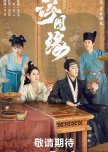
Lost You Forever
93 oamenii au considerat această recenzie utilă
The Princess Bride.
Lost You Forever is a dark, beautiful, suspenseful and, poignant tale of intrigue, treachery and longing. This drama is immersive with its air of mystery, the shiver of danger, a whisper of regret and a sense of profound loss and longing that saturates every scene. It is a story about love but it is not a love story. It is a far more complex and expansive exposition of the many kinds of love and how it can be restraining and boundless at the same time.Set in Dahuang, a magical, treacherous and unpredictable world where humans, demons and deities co-exist, two forsaken royal orphans vow to always cherish and protect one another. Shattered by a broken promise, Xiao Yao loses herself, misplaced during a time of great turmoil. She assumes the appearance of a man and lives among the humans and demons of Qingshui Town as the village fertility doctor. This is the most exciting arc because everyone has secrets and danger lurks around every corner. When cornered, Xiao Yao is most adept at grovellng, lying or poisoning her way out of trouble. Yet she is carefree, uninhibited and almost contented in Qingshui Town with her found family. Alas, destiny catches up with her as Cang Xuan, Tushan Jing and Xiang Liu all converge upon Qingshui Town, shattering her refuge.
The latter arcs take on a political tone as Cang Xuan emerges as a contender for the Xiyan throne with Xiao Yao clearing the path for him. They must establish Cang Xuan's support base among the restless and resentful Central Plains; where the noble clans and families have complicated blood ties to remnants of the defeated Chenrong state. Xiao Yao is the princess bride, a chess piece that Cang Xuan dangles temptingly in front of the scions of the powerful aristocratic families he seeks to win over. Marriage to him is simply a means to seal alliances. He supresses his heart's deepest, secret longing by sheer willpower. Zhang Wanyi adroitly portrays Cang Xuan as a consummate politician, a very dangerous, smiling tiger / xiàomiànhǔ 笑面虎 who has his enemies in a death lock before they even know it. Love is not of paramount importance for Cang Xuan and Xiao Yao, whose destinies are interlocking as a result of their childhood oath. They work towards a greater purpose with one heart and one mind. Anyone and everyone else is always subordinated to this purpose. They are both unattainable characters who have already carved out so much of themselves for each other that there is not much left for anyone else. This is why what Xiao Yao seeks is an unequal relationship with essentially, a doormat. The princess in her however prefers that it is a doormat made of fox fur rather than a rather foolish, entitled product of too much in-breeding.
Xiao Yao is by far the darkest, most complicated, and most independent female protagonist I have come across in Chinese dramas. This is an awesome and challenging role that Yang Zi delivers magnificently. As someone who had a huge allergic reaction to her earlier works, I am speechless at her portrayal. Her Wei Xiaoliu has decisively unseated Ni Ni's Fang Weizhi as the most convincingly acted female disguised as a male character. But it is her heart-wrenching homecoming scene that can squeeze tears from a rock that truly captures the depth of Xiao Yao's sense of abandonment and despair over the person she lost forever. I can't think of another actor that has so visibly taken their acting to a high a new level the way Yang Zi has. That said, no power on this earth will make me revisit her past roles though I enthusiastically look forward to her future ones.
Tushan Jing is the weakest link in this drama both in terms of how the character is written and portrayed. Despite his stunning physical appeal, this is not a role that a promising but inexperienced actor like Deng Wei is ready for. He pulls off a charismatic and endearing Ye Shiqi that melted Wei Xiaoliu's stone-cold and lonely heart. But he lacks depth and range and visibly struggles to get into character as Tushan Jing. His perpetual stricken, deer-in-the headlight expression threw me out of some of the drama's best, most intense moments. When the Haoling King assures his daughter that the shrewd and canny Tushan Jing must have already guessed her identity, the camera pans to a dumbfounded looking Tushan Jing! I burst out laughing even though I am absolutely sure I was not supposed to. It does not help that the character's weak and indecisive waffling does not match Tushan Jing's reputation as one of the most brilliant and cunning minds of Dahuang. There is clearly also a writing issue but it does not excuse the actor's inability to make the character seem deeply conflicted rather than just weak and lacking basic smarts and survival instincts. This is a glaring weakness that weighs on both my viewing experience and my rating.
Xiang Liu is Xiao Yao's greatest nightmare, a demon that she is bonded to by a spell no one fully grasps. He is her soul mate; they are both lonely, realistic characters trapped by a cause that is bigger than themselves and thus have no free will. Tan Jianci's masterful, subtly tragic rendering of this vicious, resentful and enigmatic nine-headed demon with a shockingly passionate heart has catapulted this fantastic actor to a new level recognition. His styling is spectacular but what takes my breath away is how with the angle of the head or a flicker of an eye, his expression can change from unholy amusement to vicious cruelty; from tortured to pure, unbridled joy and affection. I don't know how Xiang Liu's story ends but the fact that he is committed to a lost cause that pits him against the person Xiao Yao protects at all costs fills me with dread. I cannot see any scenario in which this ship does not somehow sink but my heart won't listen to my head that urges me to get on the lifeboat to safety before it is too late.
Season 1 sets up the backstory of a world torn apart by war and introduces many well-written and multi-faceted characters that were collateral damage in the conflict. Intricate relationships and debts that will at some point come due accumulate between the various stakeholders. After some draggy politicking, Season 1 ends triumphantly with an unexpected twist and sets the stage very nicely for Season 2. I expect Season 2 to reveal even more secrets from the past that will force Xiao Yao to make some impossible choices. How unbreakable is her bond with Cang Xuan? Will the tragic story of Chi Chen and the Xiling witch repeat itself? Will Deng Wei finally get his act together and give us the real Tushan Jing? Will Xiao Yao shock us with her marksmanship by shooting her rival in her black heart? I hope we will not have to wait too long to find out. At the same time, I am grateful that this breaks in a good place for a time out. I have come to care too much for these characters and something tells me that this is the kind of story where even those who get what they want may not truly want what they get.
So far, Lost You Forever is the most addictive and immersive drama I have watched in 2023. I rate this a 9.0 for now because there are some notable flaws but if Season 2 comes together well, there is scope for me to revise it up.
Considerați utilă această recenzie?

Investiture of the Gods
30 oamenii au considerat această recenzie utilă
Even better than the real thing.
Investiture of the Gods is one of my less favorite Chinese classics because it is a lengthy, chaotic collection of Chinese myths and anecdotes involving gods and demons. It would not be easy to turn this tome into into a coherent and well-scripted drama with an engaging plot and proper character development. Impressively, this production pulls it off by making storyline a very, very loose adaption of the original novel. Most of the criticism highlights the plot changes and that it doesn't tell the whole story. That is absolutely fair but the end result is a vast improvement from other cheesy, incoherent and lengthy versions. As someone who is not attached to the original story-line, I am good with it.Although released in 2019, this drama was shot in 2015 and has struggled with censorship - yeah even ancient uprisings/regime change is not a popular topic with the Chinese censors. Update: Initially only 56 of the intended 65 episodes were aired but at this point, all 65 episodes have been released. It is a quality production and the for early viewers, it is well worth going back to watch the last 10 episodes in full. The all-star cast includes Luo Jin, (a very young) Deng Lun, Wang Likun, Yu He Wei and Zhang Bo. They were awesome together and it was quite evident from the rapport between the characters that they had big fun filming this. It is obvious from the CGI, sets and costumes (albeit beautiful) that this is from an older vintage than the more polished 2019 releases but it also doesn't suffer from the excessive filler disease that is plaguing the latter.
The story recounts the reign of the evil King Zhou of the Shang dynasty (an early Chinese dynasty); a time during which allegedly both gods and demons still walked among man. He was a tyrannical and decadent ruler who inflicted great suffering on his subjects under the undue influence of his favorite consort Daji. Daji is said to have distracted him from affairs of the state and exhorted him to acts of great cruelty. Even the heavens intervened and Jiang Ziya was actually an immortal tasked to raise an army of heroes to defeat this evil king. Many lives were lost in King Zhou's overthrow and these heroes were memorialized as gods in popular folklore. The novel likely emerged as a romanticized account of their epic struggle where gods and demons fought alongside mortals on both sides of the conflict. The drama very broadly sticks to this overarching plot but is creative and loose with the details around how they got there.
Yang Jian (Luo Jin) is a half immortal child born with the Third Eye predestined to cause the down fall of King Zhou. Lord Su conceals and raises him in his household as his foster son alongside his daughter Daji (Wang Likun). The young Yang Jiang and his foster sister Daji, who is renown for her beauty and kindness, are in love. This is one of the major departures from the novel, where Daji and Yang Jian barely intersect. In order to save the lives of her family and their people, Daji forsakes all to enter the palace as a concubine but they are all slaughtered anyway. Grief stricken and vengeful, she vows to make King Zhou and his empire suffer. She sells her soul to the evil thousand year old fox spirit (Deng Lun) in exchange for his aid. Wang Likun's Daji was masterful from her transformation from an innocent young girl to the ravishing, cruel and manipulative temptress that brought down an empire. I was stricken at the barely concealed loathing and sadness in her eyes when she seduces her worst enemy; I prayed she could suppress the hatred and the evil that was consuming her; I was repelled by her indiscriminate and breathless cruelty. Throughout she has sad and angry eyes and she clings to the memory of the person she once was. I was wowed by her acting. The young and yet undiscovered Deng Lun pulled off the role of the evil fox spirit who is Daji's only confidante with great relish and panache. They had remarkable onscreen chemistry - as she lost her soul he found his when her cause became his. Even though Luo Jin is technically the male lead his role of loving Daji unconditionally from afar didn't leave much scope for character development. So Deng Lun stole his thunder a bit on this one.
While Daji's scenes are mostly quite intense, the rest of the drama is somewhat irreverent and littered with comic relief. Yu He Wei's Jiang Ziya is the glue that pulls everything together this character absolutely rocked! He is kind hearted, a bit goofy, naive and unambitious immortal that is banished to the mortal realm as punishment and is tasked with investing or martyring the gods. His mortal identity is as a hapless noodle seller with a terrifying termagant of a wife and a lovely daughter. He takes Yang Jiang and Jifa as his first disciples and together they gather the rest of the immortals as they prepare for their fated mission to topple a despot. While falling safely short of slapstick , the camaraderie between Jiang Ziya and his family and disciples had me howling with laughter. Although some the comic moments dragged a little bit at the end, it was very bearable. It makes such a difference to watch something with such a confident, experienced and well-rounded cast. Even the villains were well cast and really captured the spirit of their characters, especially the evil fox spirit and King Zhou. This was truly a fun drama to watch - it has good vs evil, gods, demons, some romance, some bromance, love, hate, friendship, honor, loyalty - it made me laugh as hard as it made me cry. I enjoyed this so much I kept putting off watching the last episode because I didn't want it to end. I am not sure why this drama didn't get higher ratings but I suspect it was some combination of the plot changes, that it looks a bit dated and the fact that there was a long gap before the last ten episodes were finally released. Undoubtedly the humanization of Daji may have also been controversial - after all Daji was one of the most bloodthirsty villains in Chinese history and literature.
Considerați utilă această recenzie?

My Secret Roommate
14 oamenii au considerat această recenzie utilă
A wrinkle in time.
This is a surprisingly enjoyable short love story with a novel premise. He Zhengyu, a hot shot lawyer experiences a series of setbacks that lands him in a modest apartment. Every night, he is "haunted" by rookie reporter Chen Jialan, who occupied the apartment four months ago. A wrinkle in time brings them together each night at 10:06pm for 46 minutes. During this time they must solve a few cases that they were involved in professionally that may have set them on the road to perdition.The initial encounters between Zhengyu and Jialan are hilarious and intriguing as they both scare the hell out of each other. They had me rooting for them from the get go. But as their relationship progresses, I find Jialan remains too sweet, childish and cutesy. I expect to see their chemistry take on a more mature and adult tone later on but this doesn't quite happen. Nonetheless, I stayed invested in their story throughout and kept going even though the whole Jirong saga bored me to tears. I have not seen such bland and monotonous acting in a long time. It is almost criminal to pair up such an insipid actress with such a hot actor as Dai Gaozheng. The cast overall is not strong and it is Yang Xuwen's convincing and charismatic portrayal of Zhengyu and how he is changed by this wrinkle in time that elevates the main relationship and saves the entire drama.
The biggest plot hole in this story is He Zhengyu's lack of curiosity about who Chen Jialan was and why she vacated the apartment he moved into. You would think his first instinct would be to find out everything about her and to try to track her down. But no, he waits till very late in the game to do this. The cases are only mildly interesting and the villains are quite obvious. While the drama does a good job transitioning between the past and the present, the main characters traverse back and forth too often and too inconsequentially. The plot does become slightly convoluted towards the end, with too many twists. Despite some obvious flaws and plot holes, there are enough fresh and engaging moments that make this an entertaining watch. This is a 7.5/10.0 that will nicely tide over a dry spell.
Considerați utilă această recenzie?

The Spy Who Loved Me.
This espionage thriller about the making of a communist spy begins in 1936, a pivotal year in modern Chinese history for both then ruling Kuomintang and the rising Communist Party of China (CPC). The look and feel of this Republican era spy drama from the muted palette to the understated characters to the way even action scenes are shot is markedly different from its flamboyant, glamorous and absurdly bullet proof peer, The Disguiser. What I like about The Rebel is the realistic portrayal of spies who are much more like George Smiley than James Bond. None of the main characters have deep political or ideological convictions beyond a burning desire to expel the occupying Japanese forces from China, thus their allegiances and motives are easy to understand and relate to. The dumbing down of the competing ideologies and political factions of the day however gives the overall impression of a lack of substance that is at odds with how seriously this drama takes itself. And that is my biggest gripe: yes, those were chaotic, stressful and dark times and spying is a serious business but does it have to be so completely and utterly lacking in wit and humor?The drama opens in a thrilling and suspenseful way with the arrest of a CPC operative by Chen Moqun, the head of the Shanghai district of the Fuxing Club, which is the Kuomintang's secret service. Together with his young protege Lin Nansheng, they use psychological warfare to turn him and use him to try to weed out the Mailman, a long hidden spy in their midst. Thus begins a chilling, suspenseful cat and mouse between two equally matched spymasters trying to out manoeuvre one another. This was by far the best arc of the drama, anchored by masterful performances by both Wang Yang (Chen Moqun) and Wang Zhiwen (Gu Shenyan). This is one of those rare dramas where the villains steal the show and on many levels they are more cunning, more ruthless and more capable than the protagonists. Chen Moqun is by far the, best most interesting character and the only one that is written with some humor - a complete sociopath, terrifyingly intelligent, flamboyant, suspicious, foolishly blinded by Lin Nansheng's competence, a surprisingly reluctant traitor and a wild party animal! Both lead actors are completely upstaged by the veteran actors for most of the drama.
I am a huge fan of Zhu Yilong and it is clear from how gaunt he looks and from the intensity of his acting that he really poured himself into this role. And he is a terrific actor so it is not to say that the role is not well acted, there are some really good moments. But overall Zhu Yilong delivers a cautious interpretation of the character and one that is not noticeably differentiated from his past roles. He has the most incredible, expressive eyes that together with the tiniest facial muscle movements, can convey an incredible range of emotions and in this case, way too many emotions. Zhu Yilong's interpretation of the character is more fitting for someone who accidentally and reluctantly becomes a spy but Lin Nansheng is a young man that voluntarily joins the spy academy and graduates practically at the top of his class - he should be more cold hearted and have a better poker face to begin with. As much as I appreciate seeing how events and relationships reshape his values and ideals over time into burning conviction, it is better to have to occasionally guess at his emotions rather than to see everything written all over his face. It is telling that later in the drama when he matures into a colder more inscrutable spy, they cover his eyes with tinted glasses to stop them from spewing his guts. His journey is portrayed as very lonely and intensely introspective; so much so that he doesn't seem to connect with most of the main characters. Thus when he mourns their loss, it doesn't always resonate.
Zhu Yizhen starts out as an archetypal character for this genre - a passionate young student CPC member that is perplexingly inspired by Leaves of Green, Walt Whitman's greatest, heavily democratic works. I don't mind the spy who loved me trope so I was really looking forward to watching her turn Lin Nansheng, recruit him and them work together as a kick ass spy team. But unfortunately it doesn't quite play out that way and she doesn't become the strong female lead character I was looking for. She remains pretty much a passionate, reckless amateur and damsel in distress that needs saving all the time. As much as I like that all of the CPC spies are written to be very fallible in the vein of John LeCarre's spies, she really takes the cake in terms of incompetence. What I find most unbelievable is she falls for the same grift twice! The only mission she manages to complete successfully is the final one. Tong Yao's portrayal of this character is textbook but bland and forgettable and her frequent blank stare with lips slightly parted gets really old very quickly. There is no spark between her and Lin Nansheng so I never bought into their rather pedestrian love story. Lin Nansheng's relationship with Lan Xinjie is deeper, far more complex, better developed from many dangerous missions and much more moving.
The first arc of this drama is everything you want a spy thriller to be. Each progressive arc is less good and they don't transition that well, leaving a feeling of anti-climax. The latter half becomes noticeably less tightly written and loses suspenseful intensity. Characters start popping up out of the blue from nowhere whenever someone needs to be rescued. Lin Nansheng's classmate has a particular knack for showing up at the right place at the right time. In order to advance the plot, many of the most important characters get dumbed down to be rather cursorily written off to make way for Lin Nansheng to step up. I didn't like how some of the best most interesting power dynamics between Chen Moqun, Gu Shenyan and Wang Shian fizzle out without coming to a climax, a moment of truth and closure. Thus when Lin Nansheng comes of age, he isn't even going up against truly worthy opponents and there is no psychological thrill. The last arc is the weakest, it is too long of a time jump, deviates into patriotic tropes, gratuitous sacrifices, leaves open threads and like most of the arcs, comes to an anti-climatic and very predictable end.
If I have to rate just the first arc of this drama, it is at least an 8.5 or a 9.0. Unfortunately the storytelling doesn't hold up and the second half is at best a 7.5-8.0. I really dislike dramas that fade at the back half so I rate this at 8.0-8.5. I would also note that I have read and watched a lot of amazing spy thrillers so I tend to be tougher on this genre.
Considerați utilă această recenzie?

Nirvana in Fire
32 oamenii au considerat această recenzie utilă
This is like a fine dining experience - to be savored and remembered. It deserves an 11/10.
Nirvana in Fire is an exceptional drama by any and all standards - nothing else I have watched comes even close to surpassing it. It truly checks all of the boxes in terms of a complex plot, an incredibly talented cast, excellent screenplay, well executed action scenes and overall movie-like visual impact and production quality.This is the story of Lin Shu's single minded quest for justice and reform. His father, a powerful general in command of the 70,000 strong Chiyan army is framed as a traitor while away defending the Liang state. Victorious but battle worn, he is slaughtered along with his entire army before they have a chance to return to the capital. Young Lin Shu barely survives and re-emerges 12 years later as Mei Changsu, the mysterious leader of the powerful pugilist Jiangzuo Alliance. His appearance is completely altered and he is a sickly, shadow of the vigorous young warrior he used to be. He returns to the capital amidst a power struggle between the crown prince and his brother Prince Yu as the Divine Talent, a brilliant strategist regarded as an emperor maker. He plays them against each other and is on surface allied with Prince Yu while he surreptitiously advances the out of favor Prince Jing. The complexity in the plot arises in the brilliant and occasionally cruel strategies he employs to uncover the full extent of the conspiracy and all those complicit in his family's murder as well as to advance Prince Jing's position. This is not a story about revenge, it is about justice. It is also about reform as justice is worthless without reform. Making abiding changes to the court and the system that would be overseen by a just and moral ruler was an equally important outcome to Lin Shu/Mei Changsu. To achieve his mission, he had to do many things he considered despicable. Cleaning out the corruption in the court was the only thing he could do to make the senseless massacre of his family and comrades in arms mean something.
This is an impossible show to binge watch - I can at best get through two episodes in one sitting. We learn from the get go that Lin Shu is living on borrowed time. That imbues the drama with an omnipresent sense of sorrow and inevitability that grows as it steadily progresses towards the end. Whenever the mood gets unbearably heavy, there are welcome moments of brilliantly timed comic relief. The first episode is probably the most difficult to follow as most of the key characters are introduced all at once .Thankfully there are many excellent character guides online that are super helpful in the beginning. There are no unnecessary characters in this show; each one was brilliantly cast and has an important role in the unfolding storyline.
The role of Lin Shu/Mei Changsu is a complex one and not at all easy to play. This was without a doubt Hu Ge's defining role and he just killed it. Time and again he was able to subtly convey a multitude of intense emotions behind a superficially stoic expression. As Mei Changsu the strategist, he was brilliant, ruthless, calculating, Machiavelli and breathtakingly cruel when necessary while battling his self-loathing for the person he was forced to become. He is filled with longing, regret and fear of discovery as he re-encounters his former love, friends and relatives under this new identity. He masterfully portrays a callous indifference that masks unbearable hurt as his actions and morals are misunderstood by his best loved friend. As they inevitably begin to recognize his old mannerisms and think the unthinkable, he cannot help but tease them with the truth before skillfully evading their suspicions. The chemistry between Lin Shu/Mei Changsu and the rest of the cast and in particular Prince Jing (Wang Kai) is mesmerizing. Twelve years later Prince Jing still misses Lin Shu, his boyhood friend and cousin and was never quite convinced the Lin family could be guilty of treason. Despite his contempt for Mei Changsu's lack of moral scruple, the principled Prince Jing's soul knows him and he is eventually drawn into a strong and touching bromance with him . Equally moving were the rare smiles, flashes of humor and fatherly affection that emerges when Lin Shu/Mei Changsu teases Fei Liu, his lethally skilled and fiercely loyal boy protector. Despite his crushing physical weakness, he desperately lies to shield his loved ones from the extent of his suffering and true condition. I found myself grieving for not only the lost friendships and love affair that could have been but for the Lin Shu that Mei Changsu can never become again.
The character development in this drama is so sophisticated and multi-layered that even the worst villains of the piece are to evoke a sense of pity for their human failings and have some redeeming aspects. The story builds towards an epic climax that sees Lin Shu/Mei Changsu confront the person ultimately responsible for this terrible and unforgiveable betrayal. Both actors in this final showdown were phenomenal but I think the tyrant's rant from rage,to hubris, to denial, to defeat , to defiance and then finally to almost but not quite remorse truly blew me away. It is in this encounter that Lin Shu delivers his most excoriating, most tragic and and most damning indictment -"If you knew your son you would never believe he could betray you. If your son knew you, he would not have refused to believe you betrayed him." The script writing is powerful and we are treated to many emotionallly loaded lines but for me, this one was the one that summed up the root of the tragedy and made me weep for both of them. But Lin Shu/Mei Changsu was beyond tears. It is this ability to convey bottomless sorrow without shedding a tear that made this Hu Ge's unparalleled performance.
{Warning - Spoiler ahead]
I love it that this show pretty much ends after the climatic peak with most of the loose ends tied up well ahead. Even though we know from the very beginning that Lin Shu/Mei Changsu dies, it still broke my heart. Nonetheless, the drama comes to a very fitting and satisfying end. While this was an enthralling, immersive journey from start to finish, I think I need to take a break with something less intense. I suspect this will remain the very best drama I have ever seen for a long time although I still love Ten Miles of Peach Blossoms best.
Considerați utilă această recenzie?

The Advisors Alliance
19 oamenii au considerat această recenzie utilă
The king maker is king of kings.
Note: There are some statements of well known. historical facts in this review. They are by definition not spoilers but be warned in case you are unfamiliar with the history of this period.Sima Yi, courtesy name Zhongda. History's most cunning grifter, a man who stole a throne and an empire more than once! I always enjoy dramas like this because they bring larger than life historical characters to life and deflate them into close to normal human beings. I never imagined Sima Yi would be portrayed as such a timid, groveling, deceptively harmless and well, just ordinary fellow. Or that he would be so terrified of his wife. That just cracked me up. Audacious.... sacrilegious even.... love it!
The drama opens with Zhongda, a brilliant scholar and tactician, welcoming his firstborn son Sima Shi into the world. His father Sima Fang is a shrewd and influential minister of the Han Imperial Court. By then, warlord Cao Cao had already openly seized power and repeatedly bullies the Han Emperor into a sniveling, terrified puppet. Zhongda unwittingly catches the eye of Cao Cao as he deftly extricates his father from a dire situation. He goes to extreme lengths to avoid serving Cao Cao who is both keen to make use of his talent and wary of it at the same time. Recognizing his innate cunning and ambition, Cao Cao regards him suspiciously as a double edged sword and comes close to killing him dead many times.
Initially I was surprised and a little bit underwhelmed to see such a timid and groveling Sima Yi. But the layers peel away very satisfactorily to reveal his hidden ruthless nature, his scheming and bold ambition. He is a king maker, someone capable of securing the throne for Cao Pi, the less favored son against Cao Cao's own wishes. He then proceeds to steal an empire for Cao Pi but this part seems whitewashed. I doubt Liu Xie was really that eager to so simply hand over the throne. Not surprisingly, he also intervenes in Cao Pi's succession plans. At that point, it is clear that Sima Yi the king maker is king of kings; that three generations of Cao rulers' succession is determined by this man. Notwithstanding his many contributions, Sima Yi is portrayed as a selfish and cunning character who parleys his own interests ruthlessly. He manipulates two revered ministers into sacrificing themselves to ensure Cao Pi's ascension, but it is clear his primary motive is to save his brother's life.
Sima Yi's great rivalry with Yang Xiu is rivetingly played out in the bitter succession battle between Cao Pi the worthy son and Cao Zhi the favored son. Both are ambitious and brilliant tacticians but they couldn't be more different in nature. Yang Xiu is arrogant, outspoken and extremely intuitive. He cannot help showing off, often over estimating himself and underestimating his enemies. This cost him his life and Cao Zhi the throne his father so badly wanted to give him. In sharp contrast, Sima Yi avoids attention and while he is is often underestimated, he has a healthy respect for his enemies capabilities. His final conversation with Yang Xiu, someone he empathized with, respected and learned from as a worthy opponent illuminates how Sima Yi managed to hang on to his head through many dangers. I have not watched Wu Xiubo before and I was hesitant about him as he is not the image that jumps to mind when I imagine Sima Yi. My concerns faded almost immediately and I cannot think of a better actor to play the role of Sima Yi as characterised by this production.
This drama largely sticks to history in terms of the key events and leading characters of the day. Told chronologically, the drama unavoidably peaks with the exit of the veteran actors who also play the most interesting figures of the day. This drama's highlight for me was Xun Yu's (played by none other than the fabulous Wang Jin Song) opposition to Cao Cao's decision to form his own feudal state. Their bittersweet final exchange that touched upon their long friendship, mutual respect and alignment that turned into reproach and disappointment is a powerful, memorable and compellingly acted drama moment that only two actors of such caliber can deliver. I can recommend watching this drama for that scene alone. I feel pity for anyone attempting the role of Cao Cao after Yu Hewei. I almost wept with joy at the perfection of his rendering of Cao Cao in his twilight years; the ambitious warlord stymied by the limits of his own mortality and torn by his succession dilemma between his most worthy son and his most loved son. Needless to say he is as bad a dad as he was as good a warlord and statesman. Ironically, Cao Cao sows the seeds of the downfall of his own empire as Cao Pi is also a terrible father who also messes up his own heir. Whereas the Sima family in sharp contrast are paragons of Confucian family virtue, the foundation of a moral society.
When it comes to the inner palace and familial relationships, the storytelling embellishes wild history and heavily fictionalizes the historically insignificant aspects. I was sad but unsurprised to see Cao Pi's deep friendship with Zhongda become distrustful and utilitarian after he becomes emperor. While I understand the audience appeal, it is well known that Zhongda's relationship with his wife was much less cordial but I love Liu Tao and was happy to buy into this Disney version. However the whole song and dance with Lady Bai and how Zhongda was "forced" to accept her went too far and just made me roll my eyes. I expect a man of that status in those times to have concubines I don't see the need to waste so much time suggesting he meant to be monogamous when he definitely was not. I also was not compelled by the chemistry between Cao Pi and Lady Guo but at least they didn't try to suggest he didn't have a harem. Lady Zhen's story could well just be speculative history but she is the character I felt the most sorry for in this drama.
The Advisors Alliance is the first instalment of Sima Yi's story and ends with Sima Yi retiring from active duty under Cao Pi. By then, Sima Yi and his proteges had succeeded in pushing through agricultural and structural reforms that made Cao Wei great and restrained the power of the Cao clan warlords. It is a fascinating account of how an understated and often under estimated Sima Yi was ruler in deed if not in name. His machinations paved the way for the Sima clan's rise in influence which eventually led to the founding of the Jin dynasty, which many still argue was not a legitimate state. I enjoyed this enough to rate it an 8.5 and will probably go on to watch the second season Growling Tiger, Roaring Dragon which focuses on his rivalry with Zhuge Liang.
Considerați utilă această recenzie?

Kan Bu Jian Ying Zi De Shao Nian
13 oamenii au considerat această recenzie utilă
Lost and Found.
Set in the 1990s, this is a riveting suspense thriller about three teenage boys who go missing on a dark and stormy night. Three years later, Xiao Qi, a pick-pocket is caught and identified as one of the missing boys. He is reunited with his grateful family but he does not seem quite the same and claims to have little memory of what transpired three years ago. This revives the investigation of the old case, with Wang Shitu leading the investigation. His investigation shines a spotlight on human trafficking rings. His search is painful and personal as his son has been lost for more than a decade. As the investigation advances, he gets to know Xiao Qi and the Jin family and more questions emerge as to what really happened that fateful night.This drama does a terrific job building suspense, planting the seeds of many credible explanations with each frightening new reveal. Mystery buffs will enjoy trying sorting through all the lies to pull all the pieces together. The first villain's confession however was not convincingly obtained and that case is too hastily tied up to focus on the final villain. There are too many confessions obtained using this same threat of shaky evidence against a loved one. Even though a shadowy image of the main villain and what must have happened emerges early on, the cat and mouse of pinning them down is riveting. This is one of the most layered, selfish, manipulative and just plain evil sociopaths I have seen in a long time. What is truly scary is their motive is vile but understandable; that this is easily something someone, anyone is capable of doing simply because they want what they want badly enough. The final solution however is somewhat anti-climatic; there are many more interesting ways this could have played out. There are also a fair number of plot holes and loose ends.
The strongest and most moving aspect of this narrative is not the mystery but the relationships that evolve around it. The mother and the father who lost a child and the unimaginable and continuing pain that they endure. And the lonely boy that was lost and found, and how through all this mess they somehow manage to heal a small part of each other. With this kind of cast, I don't have to praise the acting. Zhang Songwen and Rong Zishan's chemistry is well established and as expected, they deliver in spades and make me root for them every step of the way. But the most surprising and distressing performance is Guo Keyu's portrayal of Bian Meizhen's confused longing for her lost child and her devastating moments of awareness.
Overall, the mystery plot is good but does not live up to its early promise and is not as tight as could be. But the character arcs are superbly done and the ending is perfect and brilliant in the most realistic of ways. This is a highly recommended 8.5/10.0.
ENDING SPOILER COMMENTS
Doudou was a red herring from the start and considering the theme of this story is lost children, it is no surprise that there is no fairytale ending. Nonetheless, Wang Shitu does not give up and continues to look. This kind of story is not easy to write or to end in a way that acknowledges and respects the suffering of victims of child trafficking. Jin Manfu is the manifestation of what must be every parent with a lost child's worst nightmare. But this story also reminds us that there are Wang Shitus and Bian Meizhens in this world who can still open a corner of their hearts. And that maybe they can also find some solace by opening a small part of their hearts. The only small bone the drama throws the audience is Doudou probably ended up in a family with a dog and where he is much loved and may one day still be found.
X
Considerați utilă această recenzie?

Catch me if you can!
Thirteen Years of Dust is the best Light On/Mist Theatre suspense thriller iQiyi has released since The Bad Kids and The Long Night in 2020. This tightly written mystery cum police procedural is gripping from the start. An eerily staged crime scene reminds Lu Xingzhi of a serial killer that had terrorised Nandu thirteen years ago, when he was just a rookie detective. Starting with his mentor Wei Zhengrong, he gets the old investigative team that had profiled and hunted the killer back together again. They have unfinished business to get down to. Thus begins a thrilling chase for the long hidden killer who seems to be taunting them, "Catch me if you can!"The way the narrative unfolds in parallel between the present and the past is mesmerising and immediately made me invested in the main characters, including potential antagonists. In the present, the characters are older yet wear unmistakeable vestiges of the past that make them seem still touchingly familiar. We see what they were like juxtaposed against what they have become. This invokes a haunting sense of nostalgia over what was lost and what could have been. This captures the essence of what made CBS's Cold Case one of my favorite police procedural series. Wei Zhengrong seems the most markedly affected. In sharp contrast to the rather rough, dismissive, and bitingly cynical cop in his prime, he becomes a muted, wiser and oddly broken shadow of his former self. Lu Xingzhi on the other hand has delivered on his early promise and come into his own but his family life is disrupted.
Chen Jianbin and Chen Xiao anchor the stellar cast in this production. Both are charismatic and convincing actors with such incredible chemistry that it evolves to reflect the passage of time. They each subtly take on some of the other's traits thirteen years later, indicating how deeply they influenced one another. It is not easy to play characters that have aged and changed over thirteen years, yet remain essentially that character. Beyond both leads, every main character in each of the many cases delivers riveting portrayals of both their younger and older selves. This brought the victims to life through the eyes of people who knew them, loved them, feared them, envied them and may very well have killed them! The side story that moved me most was that of the gangster and the dancer.
The plot is very well designed and is a lot more whodunit than howdunit. It is set in a time when use of forensic technology was nascent and primitive. So the cases had to be approached the good old fashioned way of narrowing down suspects to who had motive, means and opportunity. The evidence and clues are all presented in an even handed manner; there is no attempt to hide anything from the viewer. From early on, the audience has enough clues to credibly build a case around at least two suspects at any given time. While the solution is not a huge surprise as the killer is well concealed but far from invisible, it still comes with a decent twist. It is a surprisingly dark story with a chilling ending for a c-drama. The production maintains an unsettling tension of a disturbing and menacing presence throughout. If I have to criticise, the staged crime scenes are a bit pretentious and the explanation of the painting and its significance is on the weak side although it just passes muster.
Overall, this is a well written and nicely executed crime thriller that will satisfy exacting crime buffs. A highly recommended watch that I rate 8.5/10.0.
Considerați utilă această recenzie?

Good enough.
This is a comedy will make you cry as hard as it will make you laugh. It is a very personal, very moving tribute of comedian, actress, screenwriter and first time director Jia Ling to her mom, Li Huanying - factory worker, volleyball player and first person in Xiangyang to own a TV.I tried to watch this shortly after its release but dropped it within ten minutes because I was put off by the fact that Jia Ling chose to play herself, the then 18-year old Jia Xiaoling. In her late 30s at the time, she just doesn't look the part of a teenager so I abandoned it before I realised that nonetheless, she feels the part because she IS the part; every emotion is heartfelt down to the tiniest nuance. And of course she is who she is today because she is a funny lady, very, very funny with excellent comedic timing. Nonetheless, the criticism that the main role is possibly mis-cast is a valid one. There are some rough edges to the overall production that are very acceptable considering this is her directorial debut.
The main premise is simple, based on universally relatable mother daughter themes. Like many, I can vividly remember being 18, feeling awkward, unaccomplished, insecure and possibly a factory production run error of my lovely and vivacious mother. We have all been Jia Xiaoling, wanting to make our mom's proud, longing desperately to be worthy while dead set certain we are not. A freak of nature transports Xiaoling back to the past, where she meets and befriends her young mom and has a chance to be a part of all the most important events in her life. She hilariously and movingly tries to change her life for the better even if it means her mom ends up with someone else to hopefully have a more worthy daughter.. And in the process she movingly comes to the realisation that she was always already good enough. These are tried and true mother daughter themes that may seem to have been beaten to death but Hi Mom still manages to articulate a fresh, creative take and deliver a moving, heartfelt twist to this tale as old as time.
This is not perfect but I can happily give it a 9.0 and call it a masterpiece because it is an unforgettable movie that will make you call your mom or hug her if you are lucky enough to be next to her. After all, this humble, low budget production is only the highest-grossing movie of 2021, the second highest-grossing non-English film of all time, and the highest-grossing film by a solo female director. If like me, you haven't seen your mom for over a year due to covid, you may want to wait to watch this. But you must definitely watch it.
Considerați utilă această recenzie?

Junk food with no calories: highly addictive and binge-worthy.
This is THE drama that revived my love for Chinese costume drama. I was hopelessly addicted and inconsolable after it ended. I hungered for the next Ten Miles of Peach Blossoms and was crushed and then frustrated when I realized there is nothing else like it. I still have to restrain myself from binge re-watching my favorite parts. My conscience always struggles with inflicting this on someone else so be warned: TMOPB will connect with you and compel you to fall in love with it but it will also ruin everything else you for a long time.At its heart, this drama very simply an intense, fantasy love fairy tale that spans three lives and three worlds. The plot is not complex, the CGI and some of the fight scenes are not the best and there are small holes and loose threads but nothing diminishes the utterly spell-blinding love story between Bai Qian (Yang Mi) and Ye Hua (Mark Chao).
In the first part of the story, Bai Qian is disguised as a boy Si Yin, the best loved disciple of Mo Yuan (also Mark Chao), the God of War. The young Bai Qian/Si Yin is a carefree, mischievous and indifferent student. A terrible betrayal by her first love that leads to a devastating war and the sacrifice of her beloved sifu Mo Yuan’s soul leaves Si Yin inconsolable with grief and remorse. If Bai Qian occasionally comes across as dislike-able, it is because Yang Mi did not successfully convey how deeply and utterly wounded Si Yin/Bai Qian was by these events. This transformed her into an aloof, cynical and outwardly cold goddess who closely guards her innately warm and loyal heart.
As for the Ye Hua character, part of his magic is there is no such thing as a Ye Hua - he is the brilliant, invincible and handsome Crown Prince of the powerful Celestial Tribe. He is also a great cook, a wonderful father and he loves only once and unconditionally. But underneath that too good to be true surface, he has his own glaring flaws. His first hopeless love is Susu, a lonely, kind heart-ed, docile mortal woman he meets on a chance encounter. It is an unequal relationship that was doomed to end in tears. As a result of his inexperience and hubris, he makes many miscalculations and ultimately betrays her in a way that tragically ends their relationship. He mourns her and waits for her return for hundreds of years and against all logic and odds. When he discovers Susu and Bai Qian are one and the same, he is elated and goes to extreme lengths to crack the ice around her heart and win her love and forgiveness. But Bai Qian is a much older and complicated woman who is initially dismissive of his puppy love. She is a high goddess and a queen and thus more than his equal. While he was thrilled by this spicier version of Susu, he finds to his frustration and fear that she has a past and her heart is not as easily won.
Mark Chao’s Ye Hua will forever be the defining Ye Hua. It doesn’t hurt that this dude has the best eye ogling motion and is capable of the most unbelievable micro facial expressions. He is not afraid to look ugly when he is terrified or devastated with grief. As Susu’s Ye Hua, he is the austere young prince who discovers love and happiness for the first time. As Bai Qian’s Ye Hua he is darker, more passionate, more aggressive and much wiser. Chao's Ye Hua literally gets better looking as the drama advances. Its an illusion that arises as he compels you with the many faces of Ye Hua; the serious and dutiful prince, the valiant warrior, the besotted bridegroom,the grieving widower, the protective father, the frustrated lover... He is equally persuasive as the stoic Mo Yuan who silently mourns the love he lost while he was recovering from saving the world.
Yang Mi and Mark Chao together are a heady, addictive combination. They are both so gorgeous that it is just a gigantic eye candy feast. This drama unabashedly spams you with steamy scenes of the two of them kissing and rolling around in bed. I suspect Mark Chao was cast as Ye Hua based solely on how shockingly good he looks lying down and his terrific acting skills were just an accidental happy bonus. Their chemistry gets noticeably more intense and you to fall in love with them falling in love. In lighter moments, the dialogue is both hilarious and touching. As a couple they subtly mock many cliche costume drama stereotypes – Ye Hua is the cook, he is Mr Mom, he cross dresses and he turns on the waterworks more easily. She is a much older woman who can drink him under the table, proposes to him and likes to lecture him. While the drama is sloppy elsewhere, Ye Hua and Bai Qian’s scenes are shot with meticulous, loving attention to detail. In each life, they hold each other the same but slightly different way when they sleep, she combs his hair the same but slightly less loving way, and when Bai Qian hugs Ye Hua the way Susu hugged him you just KNOW he has almost wormed his way back into her heart.
All of the emotionally moving scenes are accompanied by one of the four haunting love songs from the OST. The production team had a cheeky sense of humor when it came to Ye Hua’s costumes - they sneaked in a number of really sidesplitting outfits. In the memorable episode when he meets Bai Qian for the first time, he looks like Big Bird in a black feather outfit that highlights his beaky side profile in not the best way. By then, I was so smitten that the thinking part of my brain barely processes this. And then there is the cross dressing.… In most of the love scenes, Ye Hua borrowed my pajamas and copied my hairstyle. I can't explain how I am not bothered that he had the audacity to look so delicious in my nightgown. At the end he even pulls off this black with pink peach blossom flower print dress that I have aptly named Su Jin’s Revenge. None of it matters - he can speak the cheesiest lines, cry, cross dress and still come across as this crazily sexy, hot man beast. Love is blind indeed.
The strong cast of supporting characters brings this story to life - the uncle confidante, the brother and his "friend", the deranged evil concubine and the usual love rivals. There is also Dijun (Vengo Gao) and Feng Jiu's (Dilraba Dilmurat) love story which has charming and heartbreaking moments but the main couple is a tough act to follow.
I will leave to your own imagination the many hidden undertones to this show - from the somewhat taboo to the very naughty. There are many better, more well-rounded shows with more substantive and complex plots out there. This one still wins on the strength of its simple, brilliantly accomplished mission: it forces you to relive all of the joy, passion and pain of an intense love. Like junk food, it appeals to all of your most basic instincts and can result in binge-ing. Don’t ask why - just enjoy it. Over and over and over again if you must.
There are about 60 episodes of very funny bloopers on Youtube on the Croton Mega Hit channel but most of them are not translated.
Footnote: Forget the rubbish Netflix title Eternal Love, this drama is Ten Miles of Peach Blossoms.
Considerați utilă această recenzie?

Missing parts.
Let me preface this review with a warning - this is a well-loved drama that I simply fail to appreciate. If my criticism of it will offend you or ruin the joy you found in it, best give this a skip.The soundbites are tantalizing: a taboo romance between a eunuch and a concubine; a ruthless and scheming male lead; a spirited and clever female lead; and palace conspiracies and mysteries aplenty. Not to mention Wang Hedi's Xiao Duo exudes that intense tall, dark, and dangerous kind of sex appeal that screams he is no Lord Varys. So I jumped in despite my reservations over Chen Yuqi's acting. As it turns out, that is one of the drama's lesser problems.
This drama is an inane attempt at dark satire aimed at the obscene privilege of emperors. It opens with the shockingly cruel practice of sending off childless concubines, known as tribute ladies to accompany the emperor in the afterlife. After high powered eunuch Xiao Duo rescues Bu Yinlou from this dastardly fate, an alliance of sorts forms between the two as they navigate treacherous palace politics in a time of power transition. I like how it was just a mutually beneficial relationship initially and how they disliked and were wary of each other; that the romance did not blossom instantly. Where it falters is in showing me why the two most powerful men in the palace connect with and fall so utterly for a woman afflicted by bizarre facial paroxysms.
Xiao Duo's wicked ruthlessness is gleefully conveyed with wit, panache, and flawless comedic timing by Wang Hedi. This is well matched by Peter Ho's slightly over-the-top portrayal of the deceptively simplistic, cartoonish-ly obsessive, and delusional emperor. Both portrayals convey each character's underlying ethos; a past sadness and secret loneliness. Unfortunately, Chen Yuqi’s jarring and tacky comedic interpretation is far more typical of a slapstick comedy than dark satire. Her exaggerated rapid eye movement and outlandish facial expressions had me triple-checking the synopsis to see if the character is supposed to be epileptic, schizophrenic, or simply possessed. While a huge upgrade from her usual vacuous sleepwalking, for the first 14 episodes, there is little beyond brazen tasteless humor in Chen Yuqi's Bu Yinlou. After that, she gets into character and delivers some really good scenes. She has good romantic chemistry with Wang Hedi that elevates her performance and the more serious tone the story takes also helps. But her acting is not consistent and wobbles again at the ending episodes. It highlights her limited range and is quite inexcusable for someone who is an acting school graduate with a long list of drama lead role credits. This is the best I have seen from her in years but that says nothing at all.
This drama's biggest issue is that it is missing a good plot. The storyline is contrived, naive and so ridiculous it is disdainful of audience intelligence. The writer's ignorance and superficial understanding of feudal imperial inner palace workings are embarrassing. It is impossible for someone like Bu Yinlou to waltz in and out of the inner palace like it is a hotel, live at a brothel and gallivant all over the kingdom with Xiao Duo. The production leaked "cut" romantic scenes like a sieve, trying to blame the abysmal failure in storytelling on censorship. The truth is all the kiss scenes in the world cannot salvage the messy plot and inconsistent characterizations. We are told both leads are smart characters but they are actually the architects of their own troubles. The allegedly Machiavelli Xiao Duo wrests the crown prince from the custody of the one person with the highest incentive to keep him alive and healthy and puts him in the hands of the person with the strongest incentive to kill him dead! As a couple, they have repeated opportunities to escape, but choose not to. Xiao Duo's revenge is anti-climatic and hastily swept under the rug once the killer is uncovered. They flaunt their affair with such reckless impunity they so deserved to get busted. I stopped caring if they ended up together and sat on the meh ending episode for weeks. I finally finished watching this so you don't have to. To my dismay, they got an ending they didn't earn or deserve.
The bottom line is Wang Hedi is the only reason to watch this drama. He is sexy even when he glowers and scowls and his costuming and visuals in this drama are swoon-worthy. In fact, save yourself some time and just watch all the fan-made videos of the romantic scenes hard-core fans have stitched together. You can skip all the rest because as foreshadowed by the eunuch theme, this drama has critical missing parts. I can only rate it 6.5/10.0 to finish at the rock bottom of my completed list for 2022.
Considerați utilă această recenzie?

The Dark Path.
Day Breaker is a chilling undercover narcotics cop thriller that is part of iQiyi's 2022 Light On Series lineup. The drama is set in the fictional Hua City in a lawless Southeast Asian nation that bears an uncanny resemblance to Thailand. In this made-up world, the country is overrun by drug cartels and the police force is under resourced and susceptible to corruption. This drama has won high praise but it is one that must be watched with eyeballs glued to the screen due to the intense and elaborate plot with myriad twists and mind benders.Luo Xiang is an undercover narcotics cop pretending to be a mole in a local drug cartel. A planned takedown of a major drug deal goes horribly awry, apparently killing Luo Xiang. He re-emerges five years later as Chen Mo, a taxi driver who is tasked by Liao Yongjia to assume the identity Luo Xiang and reunite with the cartel. Li Yifeng really impresses in this role as someone juggling multiple identities while walking on the edge of discovery. His Luo Xiang has lived a lie as Chen Mo for so long that it is not clear he knows what his reality is, much less his former lover Su Qingzhu or his violent, jacked up cartel brother Longge. Luo Xiang's fascinating and oddly genuine bromance with Longge recalls Li Yifeng's iconic and manipulative performance as double agent Chen Shen in Sparrow. One of my biggest disappointments with Day Breaker is how this relationship was cheated of a satisfying denouement. While not a romance, the subtle longing and painful chemistry of the unspoken behind Luo Xiang's lies in his interactions with Su Qingzhu adds another layer to Li Yifeng's outstanding portrayal. Unfortunately this is another less than great role for Song Yi as Su Qingzhu is another character that is short changed at the end.
Both Feng Delun and Gong Haibin put in highly praiseworthy performances as Liao Yongjia and Yu Shenghai, Chen Mo's handlers in the undercover operation. In a cartel infested place like Hua City, everyone has a price and is forced to walk down the dark path, it is just a matter of to what degree. Thus as Chen Mo watches them wondering if either or both of them were moles that sold out Luo Xiang years ago, they are also testing Chen Mo to see if he is really Luo Xiang. The interplay between these three core characters as their stressors and motivators are revealed is the best, most intense part of the drama. While all three characters delivered riveting performances, it is Gong Haibin's Yu Shenghai that surprised and moved me the most and made me experience everything from rage to pity.
They are too many rival cartels in this drama and too many drug lords. Only two of them - Longge and Song Cai are multi-faceted and interesting. Longge is the ultimate outrageous fictional character, gruesomely and unnervingly violent and bizarrely comical at the same time. His wild affection for and trust in Luo Xiang clouds his survival instincts and innate shrewdness. There is an unpredictability in each of his outbursts that had my heart in my throat many times. Song Cai is also a complex cold blooded killer with his own code of conduct and many moments where his sentimentality and humanity pokes through. Both are too cursorily dealt with and sidelined in favour of less interesting villains.
While A-Xi is adorable and has some really funny scenes with Chen Mo, they were too few and far between. In general, humor is not well used to diffuse the tension in this overly convoluted plot. The drama could have ended at a climax at the end of Yu Shenghai's arc. Instead, the final two episodes rush through a contrived flash bang ending that relies on poorly fleshed out final villains, unnecessary twists and shocking but unworthy outcomes for good, smart characters. While it doesn't completely ruin the drama, this plot demands too much attention for it to sag like this at the end. Thus I must reduce my overall rating from 8.5 to 8.0 but I can still highly recommend it to fans of this genre.
Considerați utilă această recenzie?

Feng Yu Nong, Yan Zhi Luan
23 oamenii au considerat această recenzie utilă
My dear, I don't give a damn.
Gone with the Rain is one of the few Chinese dramas out there that has a very apt English title. It is also set in a time of civil war and the design of the four main characters are unmistakably inspired by Margaret Mitchell's epic classic novel Gone with the Wind. It is very much a character drama that is at surface a romance, but the true love story is the one between two women who are almost diametric opposites of one another.This story takes place in a fictional Jing state but the costumes and background suggests this loosely is late Tang dynasty when the powerful local military governors rebelled. Vast swarths of the country was thrown into civil war during which the central government had little knowledge or control over what was happening. The drama's greatest failing is that it is very sloppy in terms of clearly explain who the different factions and what their agendas are. Events unfold conveniently and not always logically simply to enable character conflict and development.
The story is told largely from seventeen year old Tang Moxi's perspective. She breaks the fourth wall in the beginning and continues to share her thoughts via very vivid, at times funny and at times silly daydreams. Moxi is illegtimate and orphaned at an early age, she grows up on sufference in the household of her uncle Bai Wentao a scheming mid-level official. Her first cousin Bai Fengyao its the only one that cares for her. The drama opens with the country on the verge of civil unrest. The cousins are colluding to evade their family's efforts to marry them off for advancement. Moxi rescues a dashing wounded soldier Wan Jiagui and falls for him. She also encounters an infuriating general Chen Wende. Through a series of misunderstandings, some self inflicted Moxi finds herself caught between both men while Wan Jiagui finds himself engaged to both women. A tortuous romantic quadrangle between the four plays out as the country slides into chaos. The romances are secondary to how the relationship between the women navigates civil war and a messy love rivalry.
Despite their different personalities and perspectives, Moxi and Fengyao share a touching and unbreakable bond. Moxi is fiesty, selfish, cynical, manipulative and tough as nails beneath her lovely exterior. She is above all a survivor; she has to be as there is only the rather helpless Fengyao in her corner. Fengyao is pretty much everything Moxi is not - selfless, well educated, gentle, sentimental, idealistic,and impractical; in other words quite useless. Their strengths and weaknesess complement and together, they are able to acutally fend quite well for each other. Unfortunately they both fall for the gallant, noble hero in heroes clothing Wan Jiagui who when tested is actually a weak character. Moxi spends most of the drama fighting her devastating attraction to Chen Wende, a rough, uncouth warrior who is more than what he appears to be. He is the only character that remains charismatic and likable throughout the drama. After awhile, it is quite obvious where these four main character blueprints are from.
The first half of the drama is quite enjoyable as Moxi and Fengyao find their strengths and struggle with their flaws in trying times. However, Moxi's wilful blindness and her obstinate pinning for her first love went on for so long it became tedious. I wanted to hurl my remote at her and yell "My dear, I don't give a damn!" Even though all the portrayals are well done and the characters are multi-dimensional, this drama spends too much time rehashing character flaws without a well fleshed out plot to keep things engaging. The conflict and attraction between Chen Wende and Moxi is the only highlight of the second half of the drama which made it less of a struggle. I also enjoyed the casting of an actress in the role of Wu Yin. The second relationship however is not sufficiently developed because all of the men can only have eyes for Moxi. The final arc is rushed and Moxi's ability to transform herself is not well explained and frankly impossible. The story does come to a satisfying ending with the final episodes making up for the sag in the latter half. This is different enough from the usual run-of-the-mill historical Chinese drama that I enjoyed many aspects of it. It is quite well acted and had it been shorter and more tightly written, I'd probably rate it better than 7/10.
Considerați utilă această recenzie?

Di Jia Qian Jin
39 oamenii au considerat această recenzie utilă
All the world's a stage.
The Double is a dark and melodramatic soap opera about revenge and regret. It is a soap opera to end all soap operas in terms of high theatrics, spinning hussies, piercing death glares, shocking twists and the sweet, savage satisfaction of retribution. To best enjoy this, don't look too hard at it as the narrative is littered with logic and plot holes and absurdly dramatic, historically impossible scenes. The male lead Duke Su flirts with breaking the fourth wall repeatedly to urge us to just watch the play, a reminder that all the world's a stage and we should just suspend disbelief.Xue Fangfei, the most elegant and cultured lady in the capital, is cruelly betrayed and dumped in a shallow grave. She is rescued by Jiang Li, the Chancellor's daughter who is wrongly condemned and banished by her family to a convent. Fangfei assumes Jiang Li's identity and returns to the capital; vowing to clear both their names and make their enemies pay. She is aided by the enigmatic and powerful Duke Su who helps her because she intrigues him and could prove useful to him down the road. The romance that develops between them unfolds at a leisurely pace as they each have high stakes agendas that predictably converge.
Duke Su must be be every scorned woman's ultimate fantasy "consolation" prize. This magnificent specimen of manhood is highly born, tall, dark, handsome, powerful, and with a diabolical mind to match Xue Fangfei's. The icing on the cake is this sexy beast that wields a fan more effectively than a sword does not come saddled with nasty in-laws. Wang Xingyue's potent portrayal of Duke Su is spot on from the tinge of humor that belies his stern expression, his double entendre laced dialogues to how in unguarded moments his eyes devour Xue Fangfei with almost indecent longing. Despite the seductive build up and combustive chemistry between the main leads, the ultimate pay-off to their slow burn courtship falls far short of wild and wicked and only delivers a chaste candle-gate moment.
Even though I shipped Duke Su and Xue Fangfei immediately, I appreciate how Fangfei takes the time to rage, to mourn her loss and to get closure so that she can properly move on. To me, Wu Jinyan obviously looks older than Wang Xingyue, butI think this casting makes sense. Xue Fangfei is a woman who lost everything; her reputation, her lover, her entire family. That kind of shocking devastation would age anyone tremendously and Wu Jinyan's ravaged, strained and wild wide-eyed expression in the early episodes is brilliantly in character. The narrative does not shy away from presenting her marriage as one that had depth and substance. Thus they are still in perfect unison when they play their haunting duet; a song of profound loss, resentment and regret. Wu Jinyan plays the avenging angel so perfectly I got unholy enjoyment out of watching Shen Yurong squirm knowing that Xue Fangfei, who knows him better than he knows himself, is coming for him.
Shen Yurong is a character that I find hard to be that angry with because as it turns out, his perfidy results in such a massive upgrade for Xue Fangfei. Liang Yongqi really slays in this complex role of a promising, rising young official who catches the eye of the wrong woman and ends up betraying his ideals. He is quite a pitiful creature who trades in domestic bliss for living dangerously at the beck and call of an abusive, insecure and bat-shit crazy spinning shrew that his own dear mother pimps him out to. I can't decide if I pity him or despise him more. Because in truth, he already lost the moment he chose to betray his muse and the love of his life. The moment of peak retribution is when it dawns upon him what a prize he lost and is forced to face the limits of his own character. I thoroughly enjoyed how the narrative peels away the many layers of hypocrisy, ambition, sophistry and duplicity to reveal a weak, impotent coward who lacked the courage of his convictions. To me, this is the most complex and best acted role in this drama.
Even though I have high praise for Li Meng's portrayal of the deranged Wanning, I have little sympathy for this character or her shocking villain origin story. Victimhood does not entitle her to help herself to someone else's husband or kill with such impunity. When she had power and free will, she chose to be King Cheng's pawn, no one forced her. Likewise, I have no sympathy for Ji Shuran or her choices. In general, I dislike these attempts to whitewash villains or somehow rationalize their wicked ways. Bad stuff happened to Xue Fangfei and Jiang Li as well. But they looked for justice without turning into monsters as a result. While Xue Fangfei's revenge, if you can even call it that is very satisfying, Jiang Li's left me feeling bereft. Ultimately Xue Fangfei is a character that lost nothing and gained everything. It is Jiang Li who is truly the injured party and even though she is vindicated, all the king's horses and all the king's men can't put her together again.
Despite the addictive start, this drama loses momentum by episode 30. The storytelling lingers too long on weakest Jiang family plots arcs. They are boring and unoriginal, borrowing heavily from what were also weak arcs in Princess Weiyoung. Jiang Li's cousins are archetypal characters that were not complicit in Jiang Shuran's treachery. I find it unfathomable the drama chose to focus on their tawdry squabble over a callow rogue instead of uncovering the many layers of the far more fascinating Duke Su. As a result, this character with so much early promise ends up not as well developed as Shen Yurong and Wanning. To add insult to the injury, almost as an after thought, he is featured front and center in a baffling truncated half episode final arc that serves up gratuitous angst and some unearned and unjustified pin-cushioning of good characters. It is nothing short of a grift to squeeze money from viewers for a mundane glimpse of domestic bliss. As far as I am concerned this drama ends where it should a bit past the halfway point of the final episode. All the rest is dross.
This is a super addictive soap opera that doesn't hold up under close scrutiny. Where it excels is in serving up high drama and angst with super cool and satisfying but absurd vignettes that don't necessarily advance the plot. Nonetheless I was happy to rate this better than 8.5 until it started to sag and waffled into a lame and wishy washy ending that leaves me no choice but to call it an 8.0/10.0.
Considerați utilă această recenzie?

Who Am I?
Sakra is an overly ambitious attempt to adapt Qiao Feng's arc from Demi-Gods and Semi-Devils (天龙八部), my favorite Jin Yong novel. This is a tall task and inevitably has resulted in an overly condensed adaptation that misses the spirit of the original works. It is carried by the fact that it is such a beloved story that most viewers can fill in the gaps.Qiao Feng, the magnetic chief of the Beggar Sect is accused of dastardly crimes and outed as being of Khitan descent at a time of conflict between Song and Liao (Khitan). He is evicted from his sect and the entire wulin (martial world) turns against him. As he seeks to clear his name, he encounters Ahzu, a minion in the powerful Murong household. He risks his life to save hers and discovers that like himself, she is also on a Who Am I? quest to figure out her origins. The narrative takes on too much between the rushed and unconvincing romance, solving murders and disentangling both their back stories. The ending is confusing with hurried character introductions to pave the way for a sequel that deals with the mastermind reveal and final arcs of Qiao Feng's story. This hurried rendition makes Qiao Feng little more than a one dimensional, lean mean fighting machine. It is a pity because Qiao Feng is Jin Yong's most powerful, complex and misunderstood male character.
Qiao Feng is the ultimate master of Jin Yong's epic 18 Dragons Subduing Palm martial arts technique, which employs inner energy and is used in most of Qiao Feng's fight scenes. The action scenes are almost ridiculously bombastic - Qiao Feng pulverising an entire horde of martial arts with his amazing energy blasts; gravity defying roof leaping and up close and lethal hand-to-hand combat or swordplay. Qiao Feng's showdown with the entire wulin is the most thrilling action sequence but it comes a bit too early in the movie. It is both incredulous and stupendous to see one man take on so many. I truly feared for Qiao Feng's life but what was more terrifying was the hypocrisy and cowardice of wulin. They basically cancelled a brother-in-arms who stared down death alongside them multiple times and ganged-up on him to try to kill him! I didn't enjoy the final fight scene as much - while splendidly choreographed and thrilling, it veered too far into the territory of wildly exaggerated almost superpower like flying leaps and from a distance qi energy strikes.
I watched the Cantonese dubbed version because to me, Qiao Feng will always be Kiu Fung and Jin Yong's famous lines always sound so diminished and lacking in vehemence and intensity in Mandarin. I think this is a great watch for the action scenes alone. I rate it 7/10.
Considerați utilă această recenzie?


 37
37 143
143 7
7



















